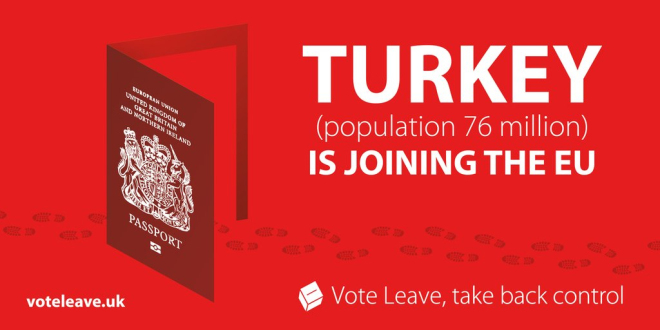Dominic Cummings, the mastermind of the Vote Leave campaign, smirked as he was grilled by BBC political editor Laura Kuenssberg about fake claims that Turkey was about to join the European Union.
Holding his right hand to his face, Cummings looked amused as Kuenssberg laid out details of the smears and misinformation his Vote Leave team had circulated about Turkey’s EU aspirations in the run-up to the 2016 Brexit referendum:
“One of the other ones you tried to use to grab the agenda was the possibility that Turkey was going to join the EU. Now to remind people it was the case that Turkey wanted to join the EU,” explained Kuenssberg.
“It was the case that many countries in the EU wanted Turkey to join one day, but it was not the case that Turkey was anywhere near joining the EU, and yet you made it one of the main issues in the campaign. And you even linked that distortion of reality to the possibility of making it easier for terrorists to come to the UK,” she stressed.
Cummings first smiled and then half-laughed as he replied, “So, again the reason I think why the Turkey issue annoyed the Remain campaign so much was because Turkey was in the process of joining the EU and had been for many years. So, like with 350, they couldn’t just say ‘this is nonsense’.”
“The Prime Minister himself had given a speech, which he said, ‘I want Turkey to join as soon as possible, and I want to pave the road from Ankara to London,” the former Number 10 adviser added.
Kuenssberg challenged Cummings over inferences that Turkey’s admission was ‘imminent’:
“But you knew that it was nowhere near something that was imminent. You knew that very well, but your message to the public was that it was imminent,” she told him.
Kuenssberg compared the misrepresentation of Turkey’s near future entry to the EU with another major Vote Leave’s falsehood, that the UK was paying the EU £350m a week. She then emphatically told Cummings that, “Turkey was not about to join the European Union.”
Cummings retorted, “We didn’t say ‘it’s about to join’, we said ‘it’s in the process of joining, which it was.”
Kuenssberg repeatedly described Cummings’ claims as “distortions” and asked him if Vote Leave had “won [the Brexit referendum] on false pretences”? To which Cummings replied, “No I don’t think we did win on false pretences,” stating that the “arguments” Vote Leave had made about the EU had been “vindicated”.
During the 2016 Brexit campaign, the pro-Leave side claimed, falsely, that Turkey was imminently joining the EU and heavily implied its membership would result in terrorists coming to Britain.
Last night Dominic Cummings, the man who ran that process, appeared to find it funny. pic.twitter.com/cskv5Udc9E
— Michael Sercan Daventry (@MichaelDaventry) July 21, 2021
While the BBC journalist didn’t put Cummings on the spot about the xenophobic nature of Vote Leave’s anti-Turkey claims during her hour-long interview with him that was broadcast on BBC 2 on Tuesday evening, 20 July, others on social media did.
Journalist Michael Daventry noted Cummings’ light-hearted reaction to the serious allegations in his tweet:
“During the 2016 Brexit campaign, the pro-Leave side claimed, falsely, that Turkey was imminently joining the EU and heavily implied its membership would result in terrorists coming to Britain.
“Last night Dominic Cummings, the man who ran that process, appeared to find it funny”.
Vote Leave’s racist claims about Turkey
Five years ago, Vote Leave caused outrage with its xenophobic anti-Turkey campaign. One of the lowest points came ahead of a football match between England and Turkey in Manchester in May 2016.
The leading Brexit camp deliberately stoked the fires of racial prejudice with a highly inflammatory statement that asserted Britons would be in danger from the EU’s free movement laws as Turkey’s criminal element could flood the UK.
Vote Leave’s statement read: “Since the birth rate in Turkey is so high, we can expect to see an additional million people added to the UK population from Turkey alone within eight years.
“This will not only increase the strain on Britain’s public services, but it will also create a number of threats to UK security. Crime is far higher in Turkey than the UK. Gun ownership is also more widespread. Because of the EU’s free movement laws, the government will not be able to exclude Turkish criminals from entering the UK.”
The deeply offensive, racist claims infuriated the UK’s half a million Turkish community, who were equally shocked to see Vote Leave launch an anti-Turkey billboard campaign nationwide.
The distinctive pillar box red poster had an image of an EU passport on one side, with the word “TURKEY” written in large capital letters next to it. This was followed by “(population 76 million) IS JOINING THE EU”. The controversial poster concluded with the campaign name and slogan “Vote Leave, take back control.”
Its exaggerations over Turkey joining the EU wasn’t the only controversial issue by Vote Leave to be highlighted in the BBC interview on Tuesday.
Another fake claim was the “We send the EU £350m a week”, which became the biggest issue of Brexit. Painted on the side of Mr Johnson’s Vote Leave campaign bus, Cummings said the slogan was deliberately chosen to “drive the Remain campaign crazy”.
When challenged by Kuenssberg on the £350m claim, he said it was based on a “true figure”. While notionally the UK was expected to make this gross contribution towards the EU budget, the simple fact was the UK had never sent £350m a week to the EU.
Vote Leave had deliberately failed to take into account the rebate negotiated for the UK by Margaret Thatcher, as well as the sums returned to Britain by Brussels, which greatly reduced that figure.
During the BBC 2 interview Cummings was also asked about his recent revelations about Boris Johnson. He said he and his Vote Leave colleagues had “taken over” the Conservative Party in order to “try and bend it to something that’s different”.
Cummings, who helped Johnson win a landslide victory in the December 2019 General Election with the slogan “Get Brexit Done”, said he and his team not only wanted to secure the UK’s withdrawal from the EU, but to also “disrupt” the UK’s power structures.
You can watch the full interview, Dominic Cummings: The Interview on the BBC iPlayer, available for another 11 months.




